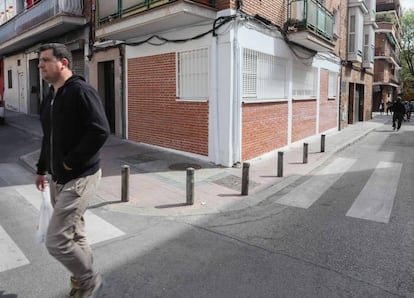House-hunters resort to commercial property as prices in Madrid skyrocket
Soaring rents and costs in the capital are prompting some to convert business properties, whether they are doing it legally or not

When the cost of housing soars, alternative solutions flourish. In Madrid, rent has spiked nearly 40% in the last four years, while the price of homes for sale rose 27% over the same period. As a result, growing numbers of people are resorting to using commercial space as housing – whether legally or not.
There is little available data to back up a reality that real estate agents have already noticed, but partial figures obtained from Madrid city records show that in the downtown district of Centro, there was a 213% rise between 2015 and 2017 in the number of requests to turn commercial space into residential space (from 23 to 72). And there were 19 requests in the first three months of 2018 alone.
One new home was rented out in a matter of days for 50% more than it was bringing in as a business premise
In the northern end of the city, in the district of Fuencarral-El Pardo, there was a 253% increase (from 15 to 53) between 2015 and 2017, and 23 requests in the first quarter of 2018. And in the Latina district, 29 rezoning applications were filed between January and March.
Miguel Otero Vidal, head of the home reform company Backhome.es, illustrates the trend with a project he recently completed south of the city: a small, 40-square-meter, ground-floor commercial space that had been lying empty more often than not. The owner finally decided to invest time and money to turn it into a residential unit, a move that involved filing a request with the city planning department, getting the project drafted and approved by the municipal architects, and paying for reform work. City technicians then granted final approval.
The new home, which has two bedrooms, a bathroom and a living room with an open kitchen, was rented out in a matter of days for 50% more than it was bringing in as a business premise. “I think that the investment will be paid off in five to six years. And if we consider all the time that it lay empty, even sooner,” said the owner, who declined to provide his name, in a telephone interview.
It is a typical case, but not the only one. “There are also people who see it as a more affordable solution in order to have a home of their own, and of course there are also a few investors who want to buy the space, give it a residential use and either rent it or sell it,” says Jorge Serrano of Apunto Arquitectura, a company that is already working on four reconversion projects, as many as it had all of last year.
This expert notes that despite an overall rise in prices, “some business premises on secondary streets with little human traffic still have significantly lower price tags, allowing many people to adopt this solution in order to obtain a home at a better price.”
Location is key, since central commercial space can be nearly as expensive as housing
Otero figures that the difference could be as high as 40%, taking all extra costs into account. But of course location is key, and anything outside the M-30 ring road will be a better deal, since centrally located commercial space can be nearly as expensive as housing.
Charlie Díaz, an architect, is currently transforming a commercial space in Lavapiés into a home for a woman in her thirties who decided that this is the only way that she can live in the home of her dreams and in the neighborhood that she likes.
Díaz, who has been working in the field for years, confirms that the trend is growing, but he also issues a few warnings to would-be buyers: bank loans do not come with the same conditions, and people should research whether it is legally possible to switch from a business use to a residential use, as this typically involves prior approval by the building owners’ association (if not in terms of the rezoning itself, at least in terms of the construction work involved, which tends to be significant).
Also, the space must meet a set of minimum requirements relating to size, windows, access points and more. And even then, “there can always be surprises,” notes the architect. “It always depends on the interpretation of the municipal technician, and regulations are often confusing.”
Facts on the ground
While official rezoning requests illustrate the trend, there are no doubt many commercial spaces that are already being used as homes without having any of the paperwork. There are no figures for Madrid, but the city of Barcelona estimates that around 3,106 business premises are currently being used either as homes or garages despite lacking any municipal authorization.
This can lead not just to fines: it also means that residents cannot use their address to sign up on the local city register – which in turn is necessary to access public health and education services – and it could make it difficult to get water and electricity utilities to service the home.
It is also impossible to take out home insurance on a commercial property, with the risk it entails if third parties sustain any damage. And residents are constantly exposed to the possibility that a neighbor will report them to the authorities, who will then send an inspector along.
To Charlie Díaz, the key issue to take away from all this is that getting an official rezoning permit. while costly and time-consuming, will add new value to one’s investment. “As long as it remains a commercial space, it will cost the same, but if it is turned into a residential property, it will be worth 30% or 40% more.”
English version by Susana Urra.
Tu suscripción se está usando en otro dispositivo
¿Quieres añadir otro usuario a tu suscripción?
Si continúas leyendo en este dispositivo, no se podrá leer en el otro.
FlechaTu suscripción se está usando en otro dispositivo y solo puedes acceder a EL PAÍS desde un dispositivo a la vez.
Si quieres compartir tu cuenta, cambia tu suscripción a la modalidad Premium, así podrás añadir otro usuario. Cada uno accederá con su propia cuenta de email, lo que os permitirá personalizar vuestra experiencia en EL PAÍS.
¿Tienes una suscripción de empresa? Accede aquí para contratar más cuentas.
En el caso de no saber quién está usando tu cuenta, te recomendamos cambiar tu contraseña aquí.
Si decides continuar compartiendo tu cuenta, este mensaje se mostrará en tu dispositivo y en el de la otra persona que está usando tu cuenta de forma indefinida, afectando a tu experiencia de lectura. Puedes consultar aquí los términos y condiciones de la suscripción digital.









































